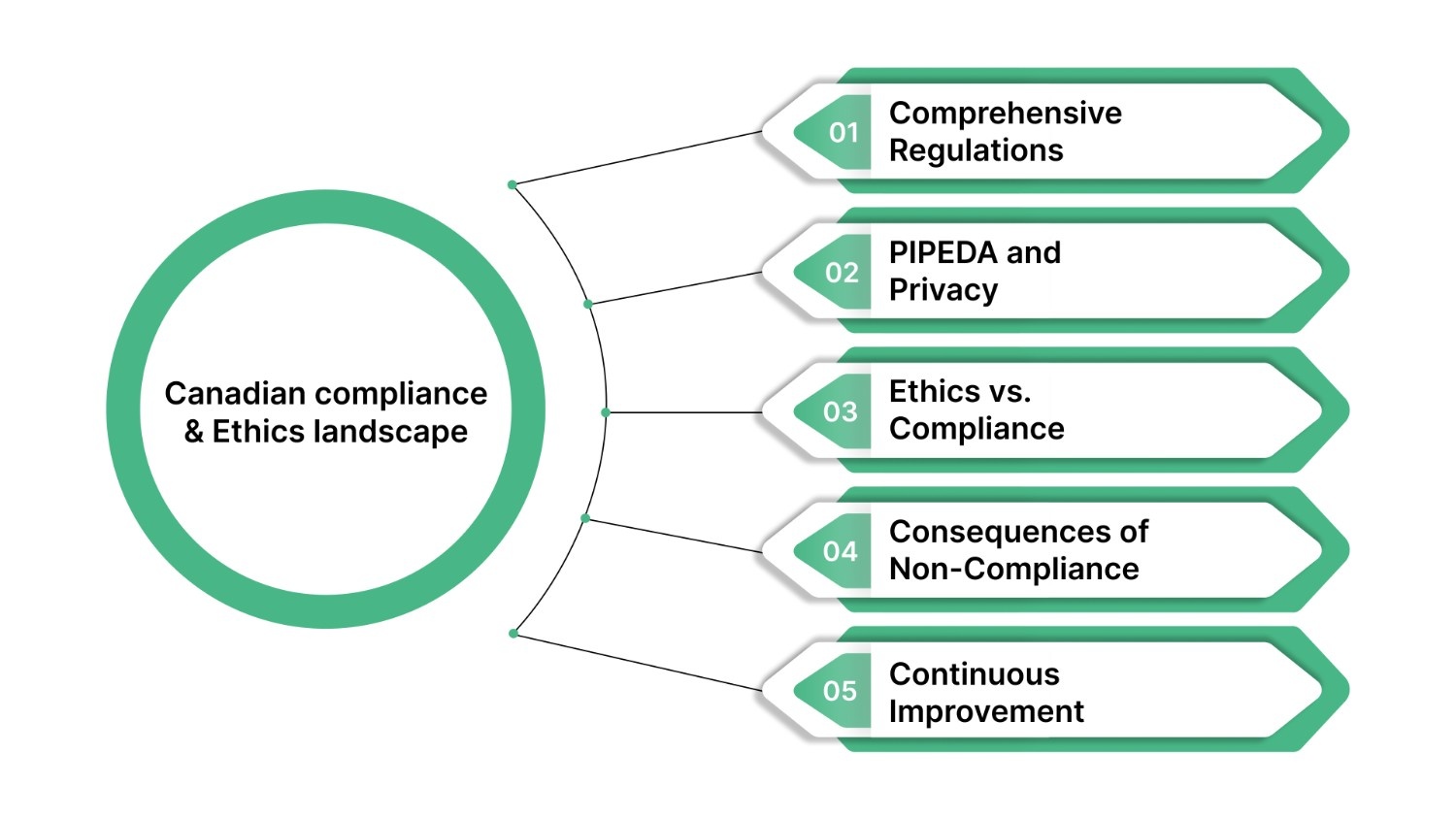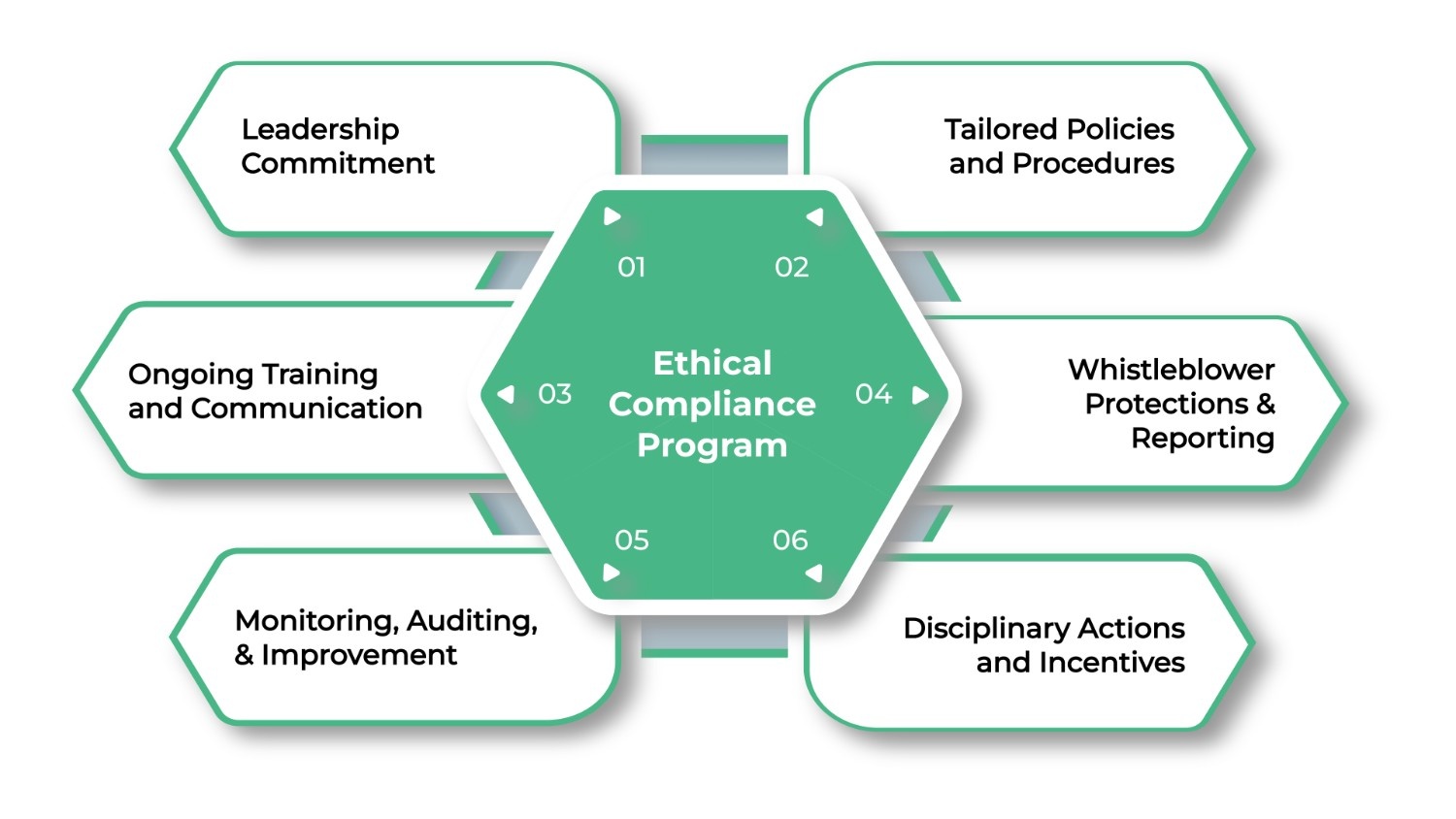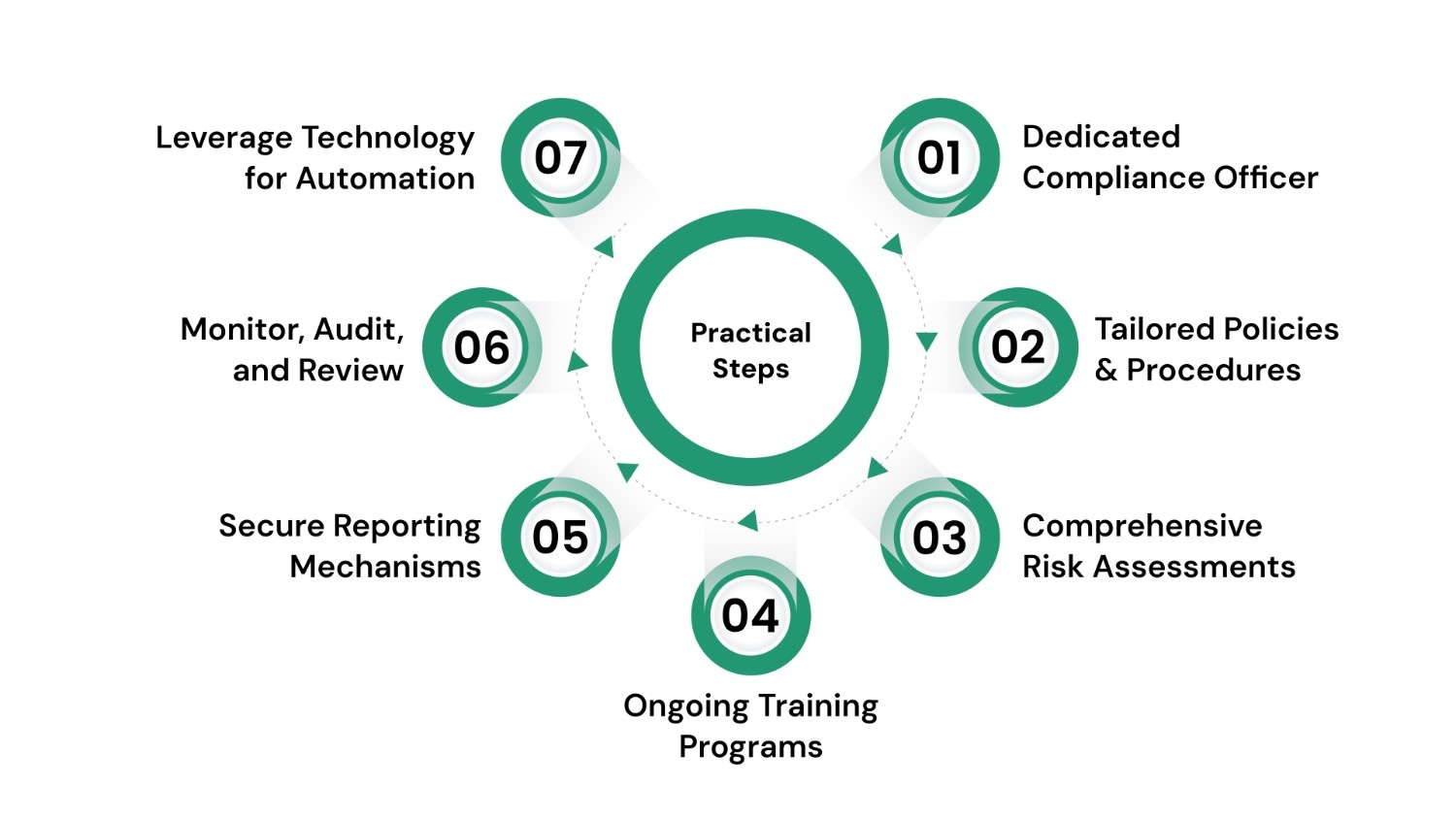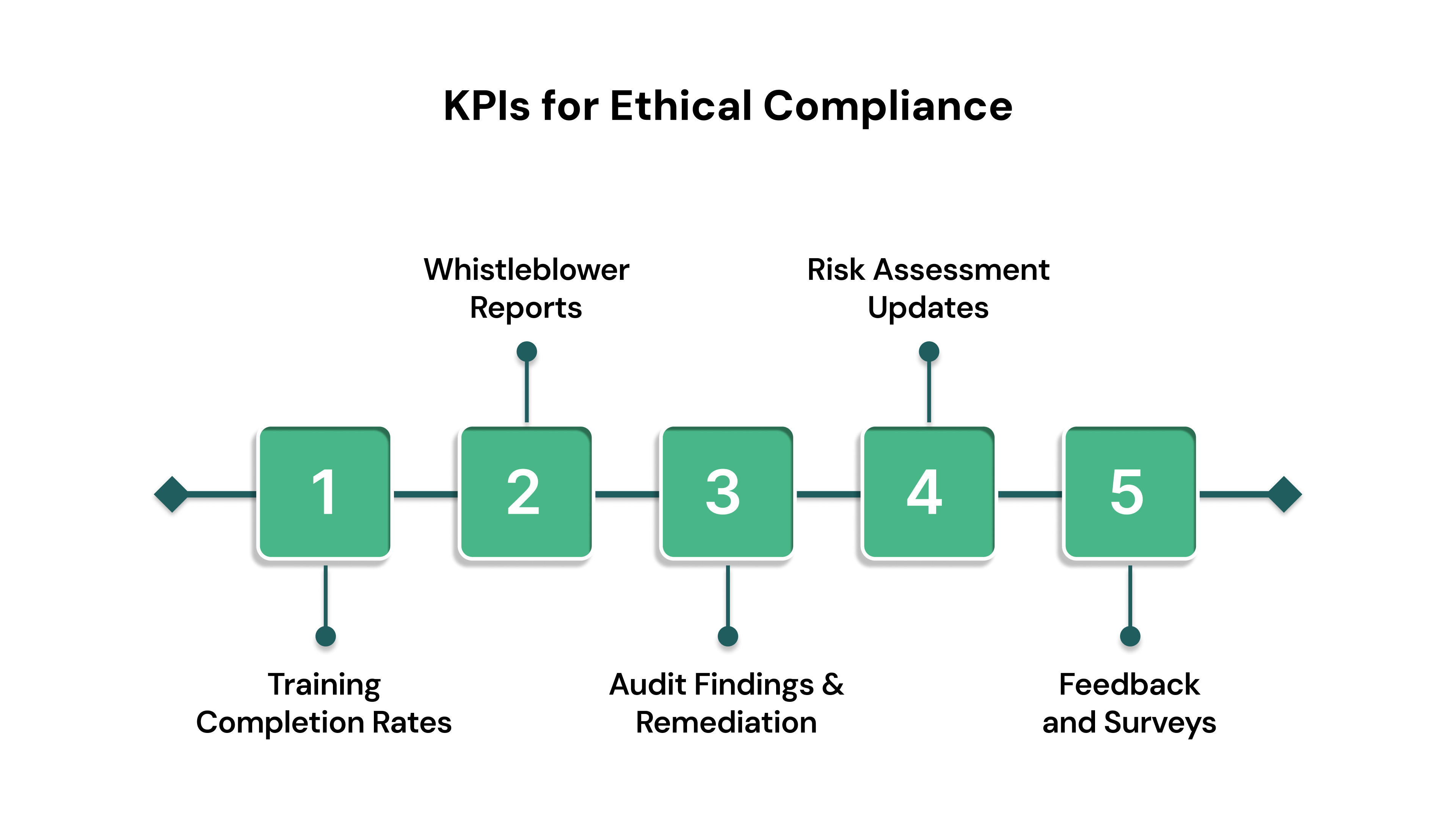Embedding Ethics into Compliance Programs in Canadian Enterprises
Canada has a strong regulatory framework that emphasizes both legal compliance and ethical business conduct. Key laws like the CBCA and PIPEDA, along with provincial regulations, require organizations to embed compliance and ethics into their core operations—not just meet minimum legal standards, but foster responsible and principled behavior.

Embedding ethics into compliance isn’t optional for Canadian enterprises. It’s an operational necessity.
Regulators, boards, and stakeholders now expect more than policy adherence. Under laws like the Canada Business Corporations Act (CBCA), Personal Information Protection and Electronic Documents Act (PIPEDA), and provincial governance codes, enterprises must show how ethical conduct is built into daily decision-making, not just documented in codes of conduct.
A compliance program without ethical grounding may meet minimum requirements but often fails when tested, whether during audits, investigations, or public scrutiny.
In fact, companies with the strongest ethical cultures outperform those with weaker ones by 50%, showing that ethics isn’t just about doing the right thing but also a strategic advantage.
This guide explores why embedding ethics is essential for Canadian compliance programs, the unique regulatory context, and practical strategies to operationalize ethics for long-term business success.
Key Takeaways (TL;DR)
-
Learn why embedding ethics in Canadian compliance programs builds trust, resilience, and long-term growth.
-
Understand how CBCA, PIPEDA, and governance codes demand ethical conduct beyond policy compliance.
-
Discover practical steps Canadian enterprises can take to operationalize ethics across daily operations.
-
Explore key elements of ethical compliance programs, from leadership commitment to whistleblower protections.
-
See how VComply empowers Canadian businesses to automate compliance while fostering ethical accountability.
Understanding Ethics in Canadian Compliance Programs
Canada’s regulatory environment is robust, requiring organizations to align both compliance and ethics at the core of their business operations. The legal framework is shaped by key statutes such as the CBCA and PIPEDA, alongside various provincial laws. These regulations are designed not only to set minimum standards for legal compliance but also to encourage ethical conduct that goes beyond mere rule-following.
Here’s what shapes the compliance and ethics landscape in Canada:

- Comprehensive Regulatory Standards: Canadian enterprises must comply with a wide array of federal and provincial laws covering areas such as privacy, anti-corruption, employment, and environmental protection. Meeting legal requirements is the baseline. Maintaining ethical standards protects reputation and builds long-term stakeholder trust.
- PIPEDA and Responsible Data Use: Under PIPEDA, organizations must obtain meaningful consent, limit data collection, and safeguard personal information. These are not just compliance steps. They reflect broader expectations for transparency and ethical handling of data.
- Ethics vs. Compliance in Practice: Compliance outlines what must be done. Ethics guides how it is done. Regulators increasingly evaluate programs not just on legal adherence but on whether they foster a culture of integrity, fairness, and accountability.
- Consequences of Non-Compliance: Failure to integrate ethics into compliance can lead to more than regulatory penalties. It can result in investigations, public backlash, and long-term damage to brand credibility, as seen in several CBCA enforcement actions.
- A Continuous, Company-Wide Effort: Strong programs require ongoing training, clear reporting channels, and leadership accountability. Employees must know their responsibilities and feel safe reporting unethical behavior without fear of retaliation.
Canadian enterprises that prioritize both compliance and ethics are better equipped to navigate regulatory complexity, build stakeholder trust, and achieve sustainable growth in an increasingly scrutinized business environment.
Also Read: Top Compliance Risks for Canadian Financial Institutions 2025
Why Embedding Ethics Is a Strategic Advantage for Canadian Enterprises
In Canada, embedding ethics into compliance programs is not just a regulatory expectation; it’s a strategic imperative for building trust, safeguarding reputation, and ensuring long-term business success.
Canadian regulators and policymakers increasingly expect organizations to go beyond basic legal compliance and demonstrate responsible business conduct that aligns with both international and domestic standards.
Key reasons why ethics matter for Canadian enterprises:
- Trust and Reputation: Ethical business practices are fundamental to earning and maintaining stakeholder trust. In the Canadian context, this trust extends to customers, employees, investors, and regulators. A single ethical misstep can result in significant reputational and financial damage, while a strong ethical culture fosters loyalty and resilience.
- Alignment with International Standards: Canada has ratified nine of the ten International Labour Organization (ILO) Fundamental Conventions and adheres to global frameworks such as the UN Guiding Principles on Business and Human Rights (UNGPs) and the OECD Guidelines for Multinational Enterprises. These commitments signal that Canadian businesses are expected to meet or exceed internationally recognized ethical standards, not just local legal requirements.
- Evolving Legal Landscape: Recent developments, such as the introduction of the Fighting Against Forced Labour and Child Labour in Supply Chains Act, highlight a shift toward mandatory due diligence and greater transparency in business operations. While some frameworks remain voluntary, the trend is toward increased enforcement and public accountability for ethical conduct.
- Business Performance: Canadian organizations that embed ethics into their compliance programs see tangible benefits, including stronger stakeholder relationships, reduced risk of regulatory penalties, and improved employee engagement and retention.
By integrating ethics into compliance frameworks, Canadian enterprises create a culture where ethical decision-making is central to every aspect of business operations. This proactive stance not only meets regulatory expectations but also positions organizations for sustainable growth and competitive advantage in the Canadian and global marketplace.
Key Elements of an Ethical Compliance Program
An effective compliance program in Canada doesn’t stop at ticking regulatory boxes. It embeds ethics into every layer of operations, driving a culture of integrity, accountability, and proactive risk management.
Here are the core components of a strong ethical compliance program:

- Leadership Commitment: Senior management must actively support and model ethical behavior. A strong, independent compliance officer or committee should oversee the program, demonstrating the organization’s genuine commitment to ethical conduct.
- Tailored Policies and Procedures: Compliance policies should be customized to the unique risks and operations of your business. This includes clear codes of conduct, anti-bribery measures, and procedures that are regularly updated to reflect evolving risks and regulations.
- Ongoing Training and Communication: Employees at all levels need regular, practical training on both legal requirements and ethical expectations. Communication should be clear, accessible, and reinforced through multiple channels, ensuring everyone understands their responsibilities.
- Whistleblower Protections and Reporting Mechanisms: Establish secure, confidential channels, such as hotlines or online systems for reporting concerns. Employees must be assured that they can report misconduct without fear of retaliation, and that all reports will be handled confidentially and seriously.
- Monitoring, Auditing, and Continuous Improvement: Regular audits and assessments help identify gaps and ensure the program remains effective. Compliance measures should be evaluated and updated in response to changes in business activities, regulations, or identified risks.
- Consistent Disciplinary Actions and Incentives: Clearly defined consequences for violations, as well as incentives for ethical behavior, reinforce the seriousness of compliance and ethics throughout the organization.
By embedding these elements into your compliance framework, you move beyond reactive risk management and build a program that actively shapes ethical behavior across the organization.
Now that we’ve covered the foundation, let’s explore some actionable steps to embed ethics into your compliance program and make it a part of your organization’s DNA.
Also Read: Top 10 Compliance Challenges Facing Investment Firms in 2025
Practical Steps to Embed Ethics in Canadian Compliance Programs
Embedding ethics into compliance programs requires a structured, proactive approach that aligns with Canada’s evolving regulatory standards. Regulatory bodies such as FINTRAC and OSFI emphasize that compliance efforts must go beyond documentation. That means aligning leadership behavior, daily operations, and staff decision-making with ethical standards.
Here’s how to put ethics into practice across your compliance program:

1. Appoint a Dedicated Compliance Officer
Ethical leadership needs structure. Assign a compliance officer or committee with the independence and authority to oversee ethics organization-wide. Their role spans from setting expectations and resolving ethical dilemmas to tracking program effectiveness and engaging directly with senior leadership. Without this centralized accountability, ethics often become inconsistent or secondary to operations.
2. Develop Tailored Policies and Procedures
Generic policies won’t meet regulatory expectations. Draft custom policies that reflect your industry risks and operational realities. Include clear guidance on anti-bribery, conflicts of interest, data privacy, and whistleblowing. Each document should define acceptable conduct, escalation protocols, and enforcement. Ensure senior leaders regularly review and reinforce policy relevance and clarity.
3. Conduct Comprehensive Risk Assessments
Ethical compliance is only meaningful when it’s risk-informed. Conduct enterprise-wide risk assessments to identify the areas most exposed to misconduct or regulatory breaches. Use these findings to shape policies, allocate resources, and direct training. Document the process and align it with standards like PCMLTFA to show regulators a proactive posture.
4. Implement Ongoing Training Programs
Ethical training should be practical, not theoretical. Deliver ongoing, role-specific training that presents real scenarios and decision-making challenges. Help employees understand both what the rules are and why they exist. Regular refreshers, tracked metrics, and localized content foster consistency and reinforce compliance expectations across regions or business units.
5. Establish Secure Reporting Mechanisms
Create confidential, multi-channel systems that employees can trust. Offer anonymous hotlines, secure online tools, and in-person pathways. Communicate reporting outcomes clearly and follow through on investigations. Reinforce your non-retaliation policy at every stage. A safe reporting culture is essential for surfacing and resolving ethical breaches early and effectively.
6. Monitor, Audit, and Review Effectiveness
Programs must evolve based on real-world feedback. Conduct periodic audits and independent reviews to evaluate training reach, reporting response times, and case handling. Use insights from incidents and regulatory changes to refine processes. Canadian regulators value evidence of a feedback loop that strengthens controls over time.
7. Use Technology for Automation and Transparency
Manual compliance can’t scale. Use cloud-based tools like VComply to automate policy rollouts, log reports, track training, and generate audit-ready records. Technology reduces human error and ensures consistent enforcement across teams, branches, and provinces. For Canadian enterprises, it’s also essential to demonstrate transparency and responsiveness in a shifting regulatory environment.
By following these steps, Canadian enterprises can embed ethics into daily operations and build a culture of integrity that meets both regulatory and stakeholder expectations.
Also Read: Steps to Ethics Audit and Building an Ethical Culture
Key Performance Indicators (KPIs) for Ethical Compliance
Measuring the effectiveness of an ethical compliance program is essential for Canadian enterprises aiming to maintain high standards and adapt to evolving regulations. To evaluate, organizations should monitor key performance indicators that reflect both compliance activity and ethical culture.

1. Training Completion Rates: Track the percentage of employees who complete mandatory compliance and ethics training within set timeframes. High completion rates indicate strong awareness and engagement.
2. Incident and Whistleblower Reports: Monitor the number and nature of reported incidents or ethical concerns through confidential channels. An increase in reports may signal greater trust in the reporting process, while a decrease could indicate underreporting or cultural issues.
3. Audit Findings and Remediation: Analyze the results of internal and external audits, focusing on the number of compliance gaps identified and the speed of remediation. Regular audits help uncover weaknesses and drive targeted improvements.
4. Risk Assessment Updates: Evaluate how frequently risk assessments are conducted and updated in response to changes in business activities, regulations, or emerging threats. Proactive updates demonstrate a commitment to ongoing risk management.
5. Employee Feedback and Surveys: Use anonymous surveys to gauge employee perceptions of the organization’s ethical culture and the effectiveness of compliance initiatives.
Tracking KPIs is only one side of the coin. The other is building mechanisms for continuous improvement.
How to Continuously Improve Your Program?
- Biannual or Biennial Effectiveness Reviews: FINTRAC requires that Canadian organizations review their compliance program’s effectiveness at least every two years, ensuring that policies, training, and procedures remain relevant and robust.
- Actionable Insights from Data: Use compliance technology to centralize data, automate reporting, and identify trends or recurring issues. This enables timely interventions and supports a culture of accountability.
- Leadership Involvement: Senior management should regularly review compliance data, set improvement targets, and allocate resources to address identified gaps.
- Adaptation to Regulatory Changes: Keep pace with evolving regulations such as AML, privacy laws, and ESG mandates. Adjust your program structure, training, and controls accordingly to ensure it remains relevant and defensible.
Maintaining an ethical compliance program is all about building a resilient, transparent framework that changes with your business and regulatory expectations. With the right tools, Canadian enterprises can simplify oversight, improve accountability, and embed ethics into daily operations. That’s where VComply comes in.
How VComply Empowers Canadian Enterprises to Operationalize Ethics
VComply’s cloud-based GRC platform is designed to help Canadian organizations operationalize ethics within their compliance programs by providing:
- Centralized Policy and Procedure Management: VComply enables organizations to develop, update, and distribute compliance and ethics policies efficiently. This ensures all employees have access to the latest standards and guidelines, supporting consistent ethical conduct across the enterprise.
- Automated Training and Awareness Programs: The platform streamlines the delivery and tracking of ongoing compliance and ethics training, helping organizations meet regulatory requirements for employee education and ensuring high completion rates.
- Risk Assessment and Monitoring Tools: VComply supports comprehensive risk assessments, allowing organizations to identify, document, and address areas of ethical and compliance risk. Automated workflows ensure that risk mitigation strategies are implemented and monitored effectively.
- Confidential Reporting Mechanisms: Secure, digital reporting channels make it easy for employees to raise concerns or report unethical behavior without fear of retaliation, a core requirement for effective compliance programs in Canada.
See how VComply helps Canadian enterprises stay audit-ready, ethically grounded, and aligned with evolving regulations. Start your 21-Day Free Trial with VComply today.
Final Thoughts
Embedding ethics into compliance programs is not for Canadian enterprises is a strategic necessity that builds trust, protects your reputation, and supports sustainable business growth. By making ethics a core part of your operations, your organization can strengthen stakeholder confidence and brand value, reduce regulatory and reputational risks, and foster a resilient, positive workplace culture
A modern, technology-driven approach is essential for operationalizing ethics at scale. VComply’s cloud-based GRC platform empowers Canadian businesses to centralize policies, automate training, streamline risk management, and ensure continuous improvement, all while meeting the highest standards for privacy and accountability.
Ready to see how VComply can help embed ethics into your compliance program?
Request a free demo to experience a smarter, more ethical approach to compliance management.
FAQs
1. What metrics should Canadian enterprises track to measure the effectiveness of their ethical compliance programs?
Key metrics include regulatory compliance rates, mean time to issue discovery and resolution, training completion rates, number and nature of whistleblower reports, and audit findings. Tracking these helps assess program impact and identify improvement areas.
2. How often should Canadian organizations conduct effectiveness reviews of their compliance programs?
A minimum two-year effectiveness review is recommended to evaluate policies, risk assessments, training, and overall program impact. More frequent reviews may be necessary if there are significant regulatory changes or emerging risks.
3. What role does organizational culture play in the success of an ethical compliance program?
Culture influences whether employees understand, embrace, and follow ethical standards. A positive compliance culture encourages reporting, reduces misconduct, and supports continuous improvement.
4. How can organizations ensure their compliance programs are credible and effective?
By evaluating program design, implementation, and impact regularly, ensuring management commitment, providing sufficient resources, and monitoring employee adherence and reporting mechanisms.
5. What are the common challenges in measuring compliance program performance?
Challenges include selecting relevant KPIs, integrating data from multiple sources, interpreting qualitative and quantitative data, and ensuring metrics reflect both compliance and ethical behavior.
6. Can compliance technology improve the monitoring and reporting of ethics-related issues?
Yes, integrated compliance platforms can centralize data, automate training and reporting, provide real-time dashboards, and facilitate confidential whistleblower channels, enhancing program transparency and responsiveness.
7. How do whistleblower reports contribute to embedding ethics in compliance programs?
They provide early warning of unethical or non-compliant behavior, helping organizations address issues proactively and demonstrate a commitment to transparency and accountability.
8. What is the importance of leadership involvement in compliance program success?
Leadership sets the tone at the top, allocates resources, enforces accountability, and models ethical behavior, which is essential for fostering a culture of compliance and ethics.

